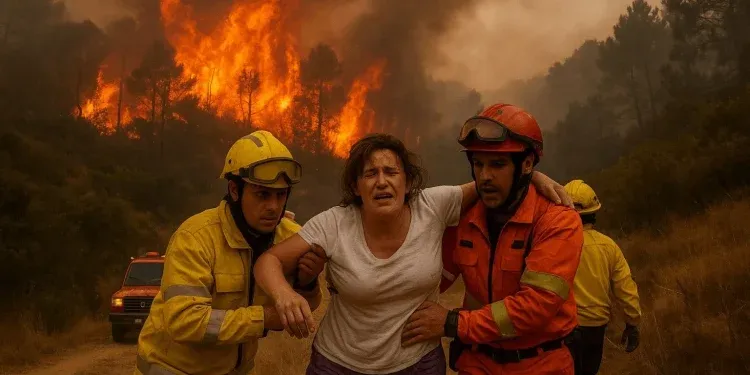The European Union has dispatched two firefighting aircraft to Spain to bolster efforts against devastating wildfires, marking the first time the country has activated the EU’s civil protection mechanism for wildfire assistance.
The move comes as Spain recorded its third wildfire-related fatality on Thursday morning and braced for worsening conditions amid an ongoing heatwave.
French Aircraft Join Firefighting Efforts in Galicia
Two French Canadair water-bomber planes arrived in Spain’s north-western Galicia region on Thursday. Local government representative Pedro Blanco emphasised the importance of cross-border cooperation:
“The fight against fires knows no borders. French resources are now in Spain to intensify efforts to extinguish forest fires.”
Spain’s Interior Minister Fernando Grande-Marlaska told Cadena SER radio that while the planes were not yet in operation, their presence ensured they could be deployed immediately if conditions worsened. He did not rule out requesting additional firefighting support.
Casualties and Arrests
A volunteer firefighter in León became the second volunteer — and third person overall — to die this summer from wildfire-related injuries in Spain. He had been hospitalised with severe burns.
Prime Minister Pedro Sánchez expressed condolences:
“We are struck once again by the death of a second volunteer who has lost their life in León. All our love and support go out to their family and friends during this unbearable time.”
Spain’s Civil Guard reported two arrests in Castille and León for allegedly starting fires that spread across thousands of hectares. In total, authorities have detained 10 people on suspicion of arson since the start of June. Causing a wildfire in Spain — even unintentionally — is a criminal offence.
Evacuations and Extreme Weather
Thousands have been forced from their homes, including 700 residents evacuated from towns in Cáceres province on Wednesday.
The Aemet weather agency warns that the heatwave — with temperatures reaching up to 44°C — will persist until Monday. Moderate winds may further fan the flames, raising fears that the fires will spread.
Wildfires in Spain have burned roughly a quarter of all fire-damaged land in the EU this year, with more than 629,000 hectares scorched across the bloc since January.
Neighbouring Countries Battle Blazes
Portugal is tackling four major fires, including one in Trancoso that has destroyed 14,000 hectares since Saturday. More than 1,900 firefighters are on the ground, and a state of alert has been extended until Sunday.
In Greece, wildfires have burned for a third consecutive day, destroying over 10,000 hectares since Tuesday morning. The most dangerous fronts are on the island of Chios and in the Achaia region of the Peloponnese. Ninety-five people — including firefighters and civilians — have been injured, and several areas remain under a red alert for extreme fire risk.
Authorities have evacuated residents by sea from Chios, with coastguard and private vessels aiding the effort. Three men have been arrested over a fire near Patras, which continues to smoulder in parts.
Albania and Turkey are also fighting major fires, with several firefighters injured in the process.
Climate and Fire Risk
While linking individual wildfires directly to climate change is complex, scientists warn that hotter, longer, and more frequent heatwaves are increasing wildfire risks. Prolonged high temperatures dry out vegetation, creating ideal conditions for fires to ignite and spread rapidly.
The EU’s civil protection mechanism has now been activated by five countries this summer — Spain, Greece, Bulgaria, Montenegro, and Albania — underscoring the scale of the crisis across southern Europe.







